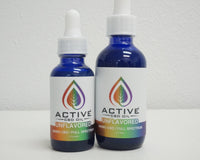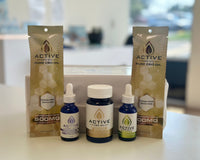Upon beginning your CBD journey, you may find you hear many unfamiliar terms while shopping around for a CBD product that most suits your needs. You will likely notice that many CBD products are broken down in a few different ways; Broad Spectrum CBD, Full Spectrum CBD, and CBD Isolate. These three classifications will be indicative of what naturally occurring compounds from the cannabis plant are present in your CBD product.
In order to have a complete understanding of why this is important and the differences between the these types of CBD, it's important to first know about what is referred to as "The Entourage Effect". There are over one hundred cannabinoids found throughout the cannabis plant, these include the other cannabis compounds we're most familiar with, CBD and THC. Studies suggest that cannabinoids may have their highest potential health benefits when they're all present and working together synergistically along side it's naturally occurring aromatic compounds called "terpenes" or "terpenoids". This 2020 study explains the Entourage Effect as "the entirety of the effect is greater than the sum effects of its contributing parts".
So, what is full spectrum CBD? Full spectrum CBD is defined as a type of cannabis extract that contain all the compounds that naturally occur in the raw state of the cannabis plant itself. This form of CBD is made up of all the naturally occurring hemp plant compounds, including less than 0.3% THC. With such low THC content, it is not typically known to have any significant psychoactive effects in most users when consumed at an average dosage size. Full Spectrum CBD can deliver the full potential benefits of the Entourage Effect, without experiencing an intoxicating high. Even though the THC content is very low in Full Spectrum CBD products, you do still run a risk of a positive drug test if you are subjected.
Even though Full Spectrum CBD products contain trace amounts of THC, they are protected by the 2018 Farm Bill, which deems hemp derived forms of cannabis as well as CBD, legal for sale and production as long at they meet any applicable FDA regulation requirements and standards. Full spectrum CBD must also be lower than 0.3% THC on a dry weight basis.

What are the Benefits of Full Spectrum CBD?
While there is some scientific evidence of CBD being effective on it's own, there have been more in-depth clinical cannabis studies performed on the effects of CBD with THC. THC has been the center of the research being done on cannabis since it was first isolated and synthesized in 1964. Only until relatively recently have scientific demonstrations shown the synergistic contributions of cannabidiol (CBD), tetrahydrocannabivarin (THCV), cannabigerol (CBG), cannabichromene (CBC). Studies show that having the full spectrum of hemp's potentially beneficial compounds, as well as the naturally occurring aromatic compounds, terpenoids can potentially enhance therapeutic effects.
This 2011 study done by The British Journal of Pharmacology focuses primarily on cannabinoid-terpenoid interactions. The study demonstrates that terpenoids, which naturally occur in all flavors and fragrances, may affect animal and even human behavior. Terpenes such as; limonene, myrcene, α-pinene, linalool, β-caryophyllene, caryophyllene oxide, nerolidol and phytol all display distinctive and individual therapeutic effects that may be an essential component to the "entourage effect" of cannabis derived products like full spectrum CBD. Showing that synergistic contributions may positively impact potential therapeutic properties when managing conditions such as; pain, anxiety, cancer symptoms, epilepsy, fungal infections and is has been shown to have powerful anti inflammatory properties. Additional science from this study shows that some non-cannabinoid plant compounds from the cannabis plant may counteract THC's intoxicating effects and strengthen the potential therapeutic effects that a full spectrum CBD product may provide.

Can You Only Get The Benefits of Full Spectrum CBD with THC?
While some users seem to benefit from the trace amounts of THC that full spectrum CBD products contain, many customers have reasons to avoid it, and some find they really don't need it at all. Although some research suggests that THC may be relatively harmless in low doses, there is still more research needed, and this may cause some shoppers to feel hesitant. Many customers turning to CBD are doing so because there looking to benefit from it's potential therapeutic attributes but due to their job, legal reasons or an upcoming drug test, they cannot have THC.
Knowing everything we know now about the bodies endocannabinoid system, and how it's influenced by the Entourage Effect as discussed above, customers all want to know: are CBD and THC better together? This may depend on the person and their own unique body chemistry. Because everyone has their own individual body chemistry and endocannabinoid system, results may vary person to person. Many users feel they can get the same effects from broad spectrum CBD as they do full spectrum CBD. Broad spectrum CBD products are a popular choice for customers who are looking to experience the potential relief the entourage effect and full spectrum CBD oils may provide, without any amounts of THC being present.

What is broad spectrum CBD?
Broad spectrum CBD products have very similar chemical components as full spectrum CBD. Broad spectrum CBD contains all the naturally occurring cannabis compounds as well as the other cannabinoids and terpenoids that are found in full spectrum CBD products, but has undergone a refining process in order to filter out THC specifically. This makes Broad spectrum CBD oil ideal for customers who are looking to use CBD for anxiety, as THC is sometimes known to induce anxiety symptoms in some users, according to this study. Often times people with physically demanding jobs rely on CBD products for their occupation induced pain, but may be subjected to a drug test by their company, this makes broad spectrum CBD products popular among this demographic as well.
There may be many reasons why a consumer may want to choose broad spectrum products rather than full spectrum products. There are also many reasons someone may feel reluctant to use a product containing THC. Whatever your reason may be for choosing any kind of THC free, the most important thing to know when purchasing nonprescription CBD products is that the product is coming from a reputable distributor. Especially if you are in the large demographic of individuals that cannot consume the less than 0.3% THC that full spectrum CBD contains. Some hemp derived CBD products claim to be THC free, even when they are not.
Any legitimate CBD establishment should be capable of providing an independent, 3rd party, lab report. This is also commonly referred to as a "COA" or Certificate of Analysis. It's important to note that the batch number for your hemp derived CBD products should be labeled clearly on the package, and should match up with the corresponding batch number on the Certificate of Analysis or lab reports. If your batch number does not match, there is no way to know for sure that the lab reports are accurate, or that the product manufacturers addressed safety when formulating the CBD products.
Currently providing this information isn't required by law. Many companies choose to opt out of providing lab testing because they're expensive to conduct, they're not being honest on their product label, or they're brand is too new to the market. If the 3rd party lab reports aren't labeled for access on your product package or on the company website, reach out to the company and ask them, they may still be a chance they are able to provide it for you. Diligence in reviewing the lab reports for your CBD products could let you know for certain how much CBD or THC is or isn't in your product as well as help you avoid things like molds, yeast, microbials, or residual solvents that can be harmful to ingest.

What is the difference in full spectrum CBD vs broad spectrum CBD vs CBD isolate?
As mentioned above, full spectrum CBD and broad spectrum CBD are both very similar aside from the fact that full spectrum CBD contains less than 0.3% THC and broad spectrum CBD contains no THC at all. Isolate CBD is more similar to broad spectrum CBD in the fact that neither contain THC, however, CBD isolate is made up of 99% pure CBD. This means, that CBD is the only cannabinoid present. In order to create hemp derived CBD isolate products the hemp plant must first undergo an extraction process usually done using C02 or Ethanol, a winterization process which removes waxes, lipids and proteins from the extracted oil, and then is put through a distillation process. The distillation process is performed to refine and purify the winterized oil in order for it to become a more concentrated CBD oil called CBD distillate. From there a crystallization procedure is implemented in order to create CBD crystals out of the CBD molecules from the distillate oil. The CBD crystals are then filtered of it's residual distillate and solvents to be dried.
Because isolate CBD isolate is CBD in its purest form, it has to undergo a more extensive and rigorous production process. Although CBD isolate does not offer the same entourage effect as a full spectrum cbd oil or a broad spectrum cbd oil, studies show that it may still provide some of the major therapeutic benefits like anti inflammatory and antipsychotic properties. Making CBD isolate products popular among customers who hope to benefit from CBD's possible health benefits that do not want to risk any chance of coming in contact with THC. Another popular demographic for CBD isolate in its original powder state is customers who wish to create their own products by adding it to any fatty acids. CBD isolate powder is oil soluble, which makes it ideal for integrating into your recipes while cooking or baking and even making your own topicals by adding it to lotions or skincare. Many users decide to skip the manufacturing processes middle man and make their own CBD tinctures using a isolate and a food grade oil carrier.
Isolate CBD can be very versatile in how it's consumed, however, many customers say the consumption experience doesn't feel as "strong" as it might with full spectrum and broad spectrum. Anecdotal experiences can vary person to person. This is because every individual has their own unique endocannabinoid system, just like a fingerprint.

How to purchase full spectrum CBD oils
Whether you decide to purchase a full spectrum CBD, broad spectrum CBD, or CBD isolate product, please consult your healthcare professional. Choose a reputable manufacturer that provides CBD from hemp plants and follows the Food and Drug Administration guidelines, avoiding any company or salesperson that makes medical claims. Any reliable CBD retailer should be able to answer any questions you may have about manufacturing operations, and provide a Certificate of Analysis as well as 3rd party lab results.



























